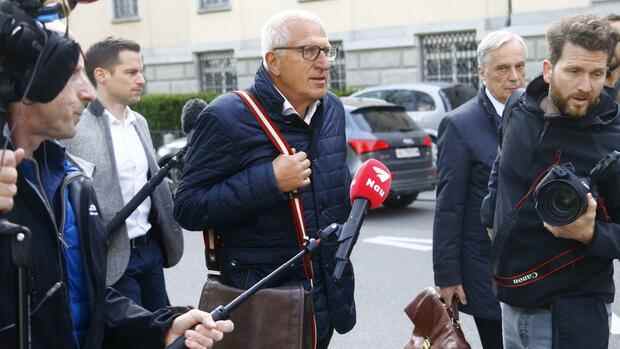The banker was sentenced to imprisonment for, among other things, fraud, embezzlement and forgery.
(Photo: Reuters)
Zurich Pierin Vincenz is one of the best-known bankers in Switzerland – and was one of the most popular for a long time. The longtime head of the Swiss banking group Raiffeisen was close to the people, appeared in comedy shows and demanded the end of banking secrecy early on. But behind the facade of the people’s tribune was an unscrupulous manager who systematically ripped off the cooperative bank for his own benefit.
On Wednesday he received the receipt: The district court in Zurich sentenced Vincenz to three years and nine months in prison for fraud, breach of trust and forgery of documents, among other things. His business partner, Beat Stocker, has to go to prison for four years.
In addition, the duo has to pay back millions of dollars. The verdict is not yet final, Vincenz announced as he left the courtroom that he wanted to appeal. The process is considered to be the largest white-collar crime in Switzerland in the past 15 years. From 1999 to 2015, Vincenz was Managing Director of Raiffeisen-Genossenschaft, the third largest Swiss banking group after UBS and Credit Suisse. He was arrested in 2018 and spent weeks in custody.
The prosecutor’s allegations, which Judge Sebastian Aeppli considered largely proven, weigh heavily: On the one hand, there is the “dry matter”, as prosecutor Jean-Richard-dit-Bressel put it. Under Vincenz’ leadership, the Raiffeisen group took over several credit card companies at inflated purchase prices, after the Raiffeisen CEO had previously secretly invested in them privately. Judge Aeppli certified the accused as having “high criminal energy”.
Top jobs of the day
Find the best jobs now and
be notified by email.
Beat Stocker benefited from the shadow holdings
Stocker, former head of the payment service provider Aduno, initially benefited from the shadow investments. For example, he passed on part of the profits to Vincenz via fictitious loans. In one case, Stocker is said to have earned 5.8 million Swiss francs, as Judge Aeppli stated in his verdict. He later transferred 2.9 million francs to Vincenz, ostensibly to help him buy a villa in Ticino. But the court and the public prosecutor’s office are convinced that Vincenz’ share of the proceeds from the sale should be settled with this.
However, the allegations of infidelity are anything but dry matter: According to public prosecutor Jean-Richard-dit-Bressel, Vincenz visited strip clubs and nightclubs “on a regular basis” and billed them to Raiffeisen as expenses. The prosecutor spoke of a “Tour de Suisse through the red light district”.
The hustle and bustle of the star banker was broadly rolled out in the tabloids during the process: Vincenz is said to have paid a total of more than 200,000 francs in strip clubs across the country with the Raiffeisen company credit card. When a dispute broke out between the bank manager and a stripper in a hotel and a suite was devastated, Raiffeisen once again paid for the repairs. Just like for a dinner with a Tinder date for 700 francs in a Zurich luxury hotel, which Vincenz described as an “application interview” in the process.
Lack of control at Raiffeisen
The excess expenses were “not in the interests of Raiffeisen,” the judge ruled. Therefore, Vincenz was guilty of infidelity. Judge Aeppli, however, also accused the bank of failings: “Raiffeisen had no professional control mechanism.” The chief supervisor at the time, Johannes Rüegg-Stürm, claims to have known nothing about the disreputable use of expenses. However, as the process progressed, it became apparent that the former boss had his own cost center and could also bill nightclub visits as dinner appointments.
Vincenz and Stocker’s defense attorneys had rejected all allegations. What the prosecution presented as splitting ill-gotten gains were actually loans. Vincenz’ lawyer referred to Raiffeisen’s successes in growth and profit under his client’s leadership. Vincenz admitted mistakes on the last day of the trial, but asked for an acquittal. His concern has always been to ensure that Raiffeisen and its holdings develop well.
With its verdict, however, the Zurich court falls short of the demands of the public prosecutor’s office, which had demanded six years in prison for Vincenz and Stocker. The court gave Vincenz a positive interpretation of the fact that he had only harmed companies, not “ordinary citizens”. In addition, Judge Aeppli saw prejudice by the media. Because journalists also published details from secret court files in their reporting, he reduced Vincenz’s sentence by nine months.
A spokesman for the public prosecutor expressed his satisfaction with the verdict on Wednesday. The court largely followed the arguments of the prosecution. Vincenz can go two further instances to contest the verdict. The deep fall of the top cooperative banker should therefore keep Switzerland busy for years to come.
More: Charges against Belgians for acid attack on ex-RWE manager
